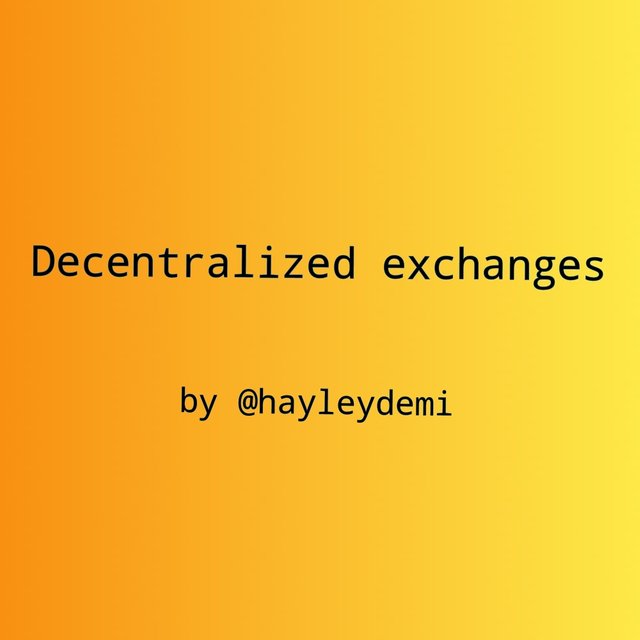Decentralized exchanges

What are decentralized exchanges
Decentralized exchanges are peer to peer exchanges where crypto traders can do transactios without having to hand over their cryptocurrencies or funds to a central authority. The transactions are executed by smart contracts which consists code that executes itself.
Decentralized exchanges are meant to eliminate the need for an intermediary authority to authorize a transaction. Decentralized exchanges majorly involves peer to peer cryptocurrency trading, which means buyers and sellers directly trade with one another.
The users of this type of exchange get keep the private keys of their wallets, hence they are non-custodial. This ensures some form of privacy as traders don't need to submit their personal details to any authority before accessing their cryptocurrencies. A private key grants users access to the cryptocurrencies in their wallets.
Comparison between decentralized and centralized exchanges
Decentralized exchanges make use of smart contracts to allow traders make transactions without having to deal with a central authority. This is in contrast centralized exchanges which are managed by an institutions or central body and are profit oriented.
Centralized exchanges are still widely used because they are reguled, easier to for newcomers to use, and provide insurance for users' funds.
Decentralized exchanges on the other hand let's traders trade directly from their wallets with smart contracts running things from the background. The users are in charge of their assets and have to bear responsibility for loss of their assets.
Decentralized exchanges are directly built on the blockchain and ethereum is the blockchain on which several popular decentralized exchanges are built.
Advantages of decentralized exchanges
Tokens are available
Decentralized exchanges can list any token as long as it is on the same blockchain the exchange is built on. Meanwhile, a centralized exchange has to verify a token and make sure it cooperates with local regulations before listing it.
This implies that new projects will probably be listed on decentralized exchanges first before being listed on centralized exchanges.
A downside to this is that a lot of scams can be listed on decentralized exchanges.
Privacy
People who use decentralized exchanges keep their personal details and identity. They don't need to submit their details to any authority. This is in contrast to centralized exchanges where users have to submit their details in a process called Know Your Customer(KYC).
Security
There is a lower probability of being hacked in a decentralized exchange as users have control of their funds and not the exchanges. Users protect their assets and only make use of platform when they need to do so.
It is Trustless
With the help of smart contracts, decentralized exchanges complete transactions and gets them recorded on the blockchain. This ensures trustless transactions(no need for an intermediary). In contrast, every transaction in centralized exchanges is managed by the central authority. Due to the fact that decentralized exchanges don't keep users' funds, hackers barely target them.
Reduced fees
As mentioned earlier, decentralized exchanges use smart contracts. This eliminates the need for intermediaries and the fees they incur. Decentralized exchanges only require the same gas fee as the blockchain they use. Hence, fees are lower for decentralized exchanges.
Disadvantages of decentralized exchanges
Users need specific knowledge
Due to the fact that decentralized exchanges can be accessed via wallets, users would be required to know how to make use of these wallets as well as understand security procedures in order to keep their funds safe.
Furthermore, it is essential that the wallet is funded with the appropriate token otherwise, sending in the wrong token could lead to loss. Hence, traders have to know which wallet to use and how to find that wallet with the right token.
Unverified token listing
Any token can be listed by anyone on decentralized exchanges. This exposes investors to a lot of scams. Hence, before buying, the traders need to verify the smart contract of the token they wish to buy, and also read the white paper of the project that made the token just to ensure it's not a scam.
Vulnerable Smart contracts
Smart contracts are made available for to the public to see. Despite the fact that exhanges try to review the smart contract code and remove bugs, some bugs still manage to escape review and may be an opportunity for hackers to take advantage of.
How to use decentralized exchange
In order to make use of decentralized exchanges, you need to connect it to a wallet that is compatible with the blockchain which the exchange is built on. Next, you need to fund the wallet with the appropriate token in order to be able to pay the transaction fees. It is necessary you find your wallet with the appropriate token because a mistake could lead to loss of funds. When you go to the exchange, click on "connect wallet" in order to connect your wallet to the exchange.
Examples of decentralized exchanges include uniswap, sushiswap and pancake swap.
Conclusion
Decentralized exchanges are a good alternative to centralized exchanges but it also has its drawbacks. It is becoming popular by the day among cryptocurrency traders.
tweet link
Note: You must enter the tag #fintech among the first 4 tags for your post to be reviewed.